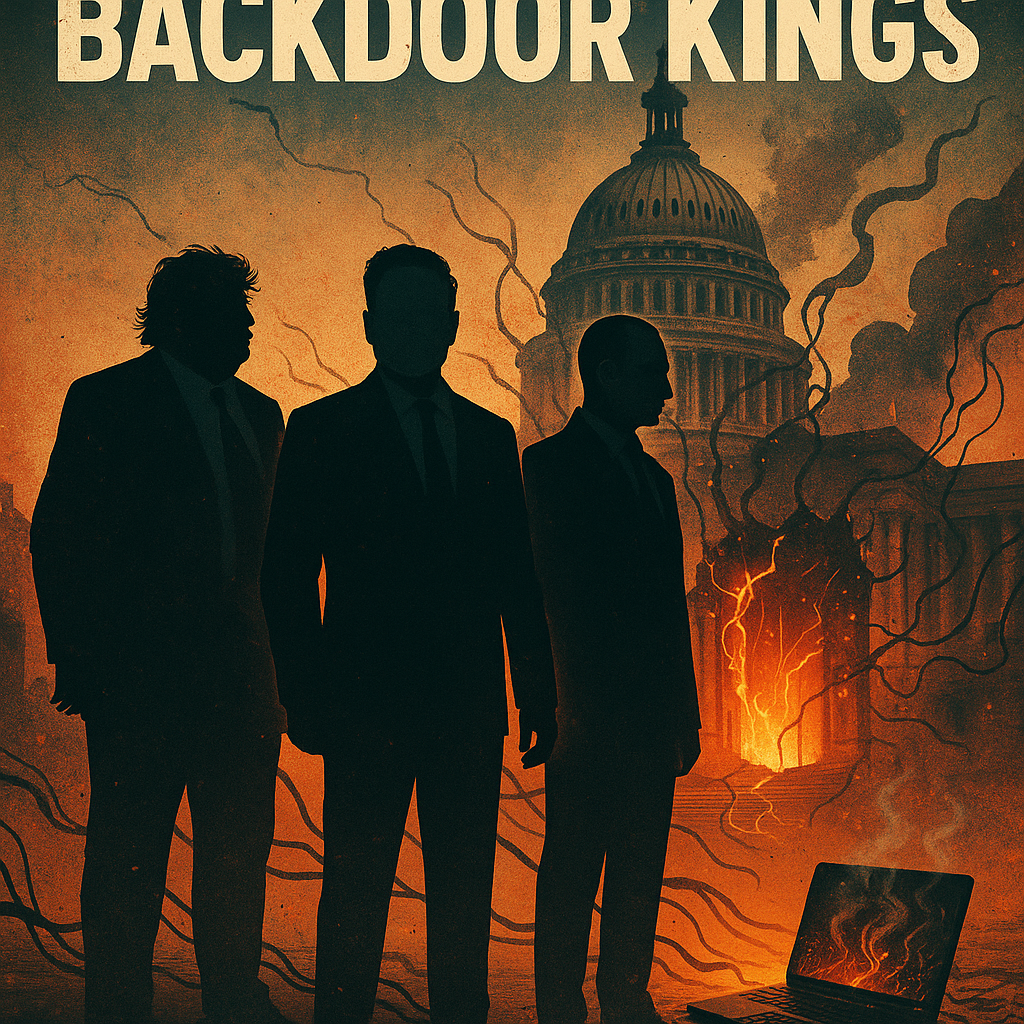By The Ghost of HST
April 28, 2025

It started like most betrayals of the American working class start now — quiet, almost polite, a black SUV sliding into the parking garage of the National Labor Relations Board with a police escort and a nod, building security waving the caravan through with the exhausted shrug of a man who knows better than to ask questions, and inside the walls, individuals identifying themselves as representatives of something called the Department of Government Efficiency — DOGE, if you’re feeling ironic — stepping out with all the gravity of mall cops on a bender. Among them, if the darker corners of hacker forums are to be believed, might have been the same manchild known as “Big Balls,” stomping into the beating heart of the agency with the casual arrogance of someone who believes gravity, passwords, and federal law are all optional settings if you can flash the right badge.
Inside the machine, the walls buckled almost immediately. Multi-factor authentication stripped away like old wallpaper; security logs wiped with a thoroughness that would impress a cartel accountant; mobile access protections torched and left to smolder in the background. A new GitHub project appeared around the same time, because why not leave your fingerprints in neon, a little number called “nxgen bdoor extract – go private” — what appeared to be a how-to manual for ripping the NLRB’s case management system wide open, though we may never really know.
And like blood bursting from a slashed artery, the data hemorrhaged out — a ten-gigabyte spike roaring through the servers in less than two hours, big enough that Daniel Berulis, senior cybersecurity manager for the agency’s cloud infrastructure, didn’t have to squint to see it. He was one of the few still trying to hold the perimeter together, a man surrounded by flaming walls pretending it was still safe to say “we have procedures for this.”
“To give somebody a global admin account and not log or track their activities or access — that’s keys to the kingdom,” he told NPR, the voice of a professional watching his entire operating reality eaten alive from the inside. “That’s something you just don’t do. It violates every core concept of security and best practice.”
He saw the spike. He saw the logs vanish. He saw the Russian IP addresses blinking in the breach window, like dying satellites trying to phone home from a system no longer built to resist.
And he understood immediately what it meant.
Because what got ripped wasn’t just case numbers and bureaucratic noise.
It was leverage.
It was the beating map of America’s remaining organized labor: whistleblowers and witnesses and bargaining leads, union organizers who still thought their testimony might be protected by something heavier than hope.
You could blackmail them.
You could erase lawsuits before they ever landed in court.
You could scrape their stories into machine learning datasets and train Grok or xAI or whatever Frankenstein project Musk is peddling next to recognize, predict, and preempt rebellion before it can even mutter the word “strike.”
You could sell it all — cheap — to anyone desperate enough to need a thumb on the scale.
And it was already happening, faster than anyone could organize a press release, let alone an investigation.
Berulis wasn’t the only one who noticed.
Other federal admins had seen it too — the sudden gaps, the ghost footprints, the quiet demands to shut up if they liked their mortgages and their families intact.
“I know that there are other admins at other agencies I’ve spoken to who’ve seen similar behavior,” Berulis said. “And they are uncomfortable speaking up, they’re uncomfortable reporting it because at the end of the day they have families, they have things on the line that have been implicitly threatened.”
This wasn’t just a breach.
It was a pattern.
And not just at the NLRB — but across the government, a slow, invisible hollowing-out of the institutions designed to protect the public from exactly this kind of plunder.
If you wanted to build a new autocratic order out of the smoking wreckage of democracy — to strip-mine labor movements, silence whistleblowers, weaponize stolen data, and rig the future at machine learning speed — this is exactly how you would do it. Quietly. Patiently. Agency by agency, firewall by firewall, until there was nothing left standing but your own private empire, fortified by ever-advancing AI and fed by everything the firewall once held back.
And if you squint hard enough through the smoke, you can almost see the outlines: the richest man in world history, the luckiest and dirtiest politician America has ever produced, and the ex-KGB strongman who treats assassination like a scheduling task — not colliding by accident, but converging by design.
Call it the Triumvirate of Corruption if you want to sleep at night. Musk. Trump. Putin.
Three names. One machine. A pipeline straight from the vaults of the government to the gulag of private greed.
What are the chances that these three unscrupulous men — the tech overlord, the failed strongman, and the ex-KGB butcher — are trying to take over the free world, Dr. Evil style? Slim? Maybe once. But growing stronger by the hour, and getting harder to laugh off with every new revelation.
It sounds ridiculous. It sounds like bad satire. It sounds like something a failing screenwriter would punch up at 3AM after too many whiskeys — am I talking about myself? maybe… — but here we are anyway, breathing it in.
And if that wasn’t enough, if you still had some flicker of belief that this was just another dumb bureaucratic screw-up and not a new chapter in the grand decline, there’s the fact — unconfirmed, but so much is these days — that rumors have begun circling that one of the DOGE figures, possibly even the so-called Big Balls himself, is the grandson of a KGB spy.
Of course he is.
At this point, it would be a bigger surprise if he weren’t.
Berulis didn’t have to say a word.
He knew what silence would buy him.
But he said it anyway.
“Standing up for this, I’m not hopeful for the outcome for me,” he said. “What I am hopeful for is that people say, hey, somebody else did it, I can do it too. And if enough people stand up, it can form a movement — and these practices, these violations, the stealing of data without anyone even knowing it’s gone — it can be stopped.”
Maybe he’s wrong. Maybe the backdoor kings already won, and we’re just playing for the right to lose a little slower.
But maybe, just maybe, if enough people decide that the firewall is still worth fighting for, there’s a chance to jam the gears one last time before the machine grinds us all into metadata.
Filed from a melted laptop at the NLRB, still oozing secrets onto the linoleum.


